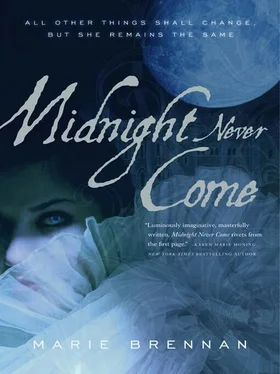The breeze off the Thames was picking up, forging a sharper edge. Anne shivered and pulled up the hood of her cloak. Deven said, “Enough of the Queen. I am one of her Gentlemen Pensioners; she calls me fair, gives me minor gifts, and finds me amusing at times, but I’ll never be one of her favorites. She cannot take much offense at the prospect of my marriage.” It had been Mary Shelton, chamberer to her Majesty, not John Scudamore of the Pensioners, who suffered the broken finger.
Anne laughed unexpectedly from within the depths of her hood. “So long as you do not get me with child, and end up in the Tower for it, like the Earl of Oxford.”
“We would run away, first.” It was a romantic and stupid thing to say. Where would they go? The only places he knew were London and Kent, and the Netherlands. The former were too near the Queen’s grasp, and the latter, no refuge at all. But Anne favored him with an amused smile, one he could not help returning.
All too soon, though, frustration returned to plague him, as it so often did. They walked a little way in silence; then Anne, sensing his mood, asked, “What troubles you?”
“Practicalities,” he confessed. “A growing awareness that my ambition and I dwell in separate spheres, and I may well never ascend to meet it.”
Her gloved hand rose and tucked itself into the crook of his elbow. “Tell me.”
This was why he loved her. At court, a man must always watch what he said; words were both currency and weapons, used to coax favor from allies and strike down enemies. And the ladies were little better; Elizabeth might forbid her women to engage heavily in politics, but they kept a weather eye on the Queen’s moods, and could advance the causes of petitioners when they judged the moment right — or hinder them. Even those without the Queen’s ear could carry tales to those who had it, and a man might find his reputation poisoned before he knew it, from a few careless words.
He never felt the need for such caution with Anne, and she had never given him cause, not in the year he had known her. She had said once, last autumn, that when in his company she could be at ease, and he felt the same. She was not the greatest beauty at court, nor the richest catch, but he would gladly trade those for the ability to speak his mind.
“I look at Lord Burghley,” he said, approaching the subject from a tangent. “Much of what Walsingham does is built on foundations laid by Burghley, and in fact the old baron still maintains his own links with agents and informants. When Burghley dies, or retires from her Majesty’s service — which won’t happen until after the Second Coming — his son Robert will inherit his barony, his offices, and his agents.”
When he paused, Anne said, “But you are not Robert Cecil.”
“Sidney might have been — he was married to Walsingham’s daughter, before either of us came to court — but he’s dead. And I am not sufficiently in Walsingham’s affections to take his place, nor ever likely to be.”
Anne squeezed his arm reassuringly. They were walking too close together, her farthingale shoving at his leg with every stride, but neither of them moved to separate. “Do you need to be?”
“To do what Walsingham does? Yes. I haven’t the wealth to support such an enterprise, nor the connections. Beale and I are forever passing letters and petitions up and down the chain, obtaining licenses for foreign travel, pardons for prisoners who might be of use, requests for gifts or pensions to reward those who have been of service. They do not often receive payment, but the important thing is that they believe they might. I cannot promise that and be believed. And even if I could… I am not in the Queen’s councils.” Deven’s mouth twisted briefly in inarticulate frustration. “I am the son of an unimportant gentleman, distinguished enough by my conduct in the Netherlands to be rewarded with a position at court, pleasing enough to be granted the occasional preferment — but nothing more. Nor ever likely to be.”
That speech, delivered in a low monotone from which familiarity had leached all the passion, carried them back to the center of the garden where the banqueting house stood. The morning was upon them in full; the Queen would be waking soon, and he had to be there for the honor guard when she processed to chapel for the service of Epiphany. But the chambers of the palace were close and stuffy, too full of people flocking to the winter court; out here the air was clean and simple, and he did not want to leave.
Anne turned to face him and took his gloved hands in her own, buff-colored leather against brown. “-You are twenty-seven,” she pointed out. “The men you speak of are old men. They achieved their positions over time. How old was Walsingham, when Elizabeth made him her Secretary?”
“-Forty-one. But he had connections at court—”
“Also built over time.”
“Not all of them. Much of it is a matter of family: fathers and sons, brothers and cousins, links by marriage—”
Her fingers tightened fractionally on his, and Deven caught himself. “I’ll not lay you aside for political advantage,” he promised.
The words brought a smile to her face that warmed her gray eyes. “I did not think you would.”
“The true problem is the Queen. I do not speak against her,” he added hastily, and could not restrain a quick glance around, to reassure himself they were alone in the garden. “I am her loyal servant. But her preference is for those of families sh-e knows — often those bound to her already by ties of blood. Of which I am not one.”
Anne relinquished his hands so she could straighten her hood. “Then what will you do?”
He shrugged. “Be of use to Walsingham, as much as I can be. Hope that he will reward me for my service.”
“Then I have something for you.”
Deven cast a startled glance at her, then frowned. “Anne, I have told you before —’tis neither meet nor safe for you to carry tales.”
“Gossip is one of the great engines of this court, as you well know. I am not listening at keyholes, I promise you.” She was a tallish woman, the top of her hood at eye level for him, and so she did not have to tilt her head back much to look at him; instead she tilted it to the side, eyes twinkling. “Are you not the least bit curious?”
He was and she knew it. “You will find a way to tell me, regardless.”
“I could be more subtle, but this is so much easier.” Anne folded her hands demurely across the front of her cloak. “’Tis a minor thing, to my eyes, but I never know when some minor thing fits into the greater patterns you and your master see. You are aware of Doctor Dee?”
“The astrologer? He had an audience with the Queen a month gone, at Richmond.”
“Do you know the substance of it?”
Deven shook his head. “He was at court only a day or two, and I did not speak to him.”
“My lady of Warwick tells me ’tis some difficulty with his house and books. Someone despoiled them while he was abroad; he seeks redress. You may expect to see more of him, I should think — or at least to hear people arguing on his behalf.”
“People such as your countess?”
“I thought you did not want me carrying tales.” She laughed as he mock-scowled at her. “I imagine your master knows of his situation — they are friends, are they not?- — but I can learn more if you would like.”
This, he was unpleasantly aware, was often how espionage worked. Few of those who fed Walsingham information did so in an organized and directed fashion, deliberately infiltrating places where they did not belong, or masquerading as that which they were not. Most of the intelligence that reached the Principal Secretary came from men who simply kept their eyes and ears open, and wrote to him when they saw or heard something of interest.
Читать дальше












